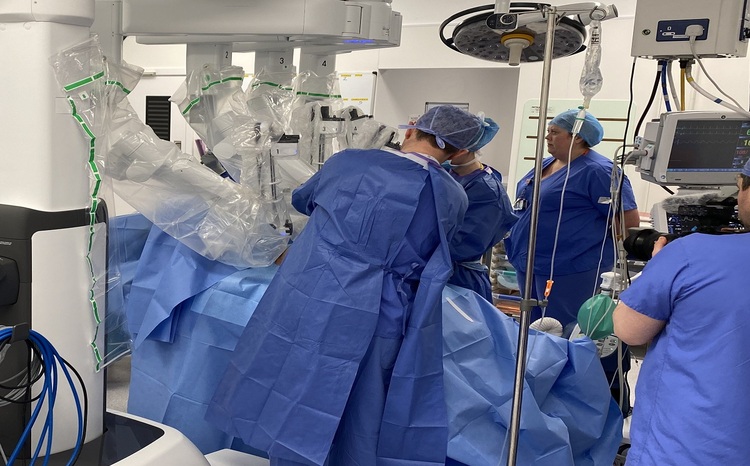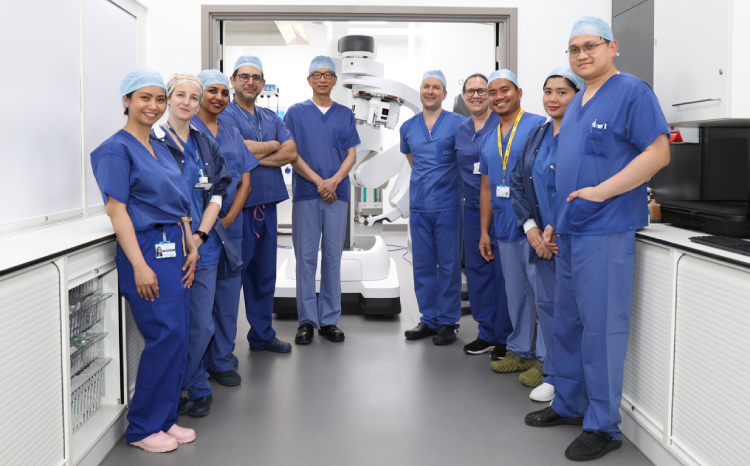10,000 patients in Scotland benefit from robotic-assisted surgery
- 6 February 2025

- More than 10,000 patients across Scotland have benefitted from da Vinci robotic-assisted surgery (RAS) since 2021
- The Scottish government has invested in 12 additional da Vinci surgical systems since 2021
- The primary aim of the expansion was to improve access to RAS for gynaecology and colorectal patients, which had the highest rates of open surgery in Scotland
More than 10,000 patients across Scotland have benefitted from da Vinci robotic-assisted surgery (RAS) since 2021, following a major expansion of da Vinci surgical systems.
The Scottish government has invested in 12 additional da Vinci surgical systems since 2021, with the aims of reducing rates of open surgery, improving equity of access and outcomes for patients, and enhancing NHS productivity.
In NHS Greater Glasgow and Clyde, these systems are in place at the Glasgow Royal Infirmary (GRI) and Queen Elizabeth University Hospital (QEUH).
Professor Campbell Roxburgh, consultant colorectal surgeon, at the University of Glasgow and GRI, said: “Thanks to the Scottish government’s continued investment in this cutting edge technology and its ongoing implementation across the nation, we are now realising what we set out to achieve through the expansion – we have vastly reduced rates of open surgery and we have improved equity of access to robotic-assisted surgery and its associated outcomes for patients.
“To reach this significant national milestone is testament to that.”
The primary aim of the expansion was to improve access to RAS for gynaecology and colorectal patients, which had the highest rates of open surgery in Scotland. It also supported continued expansion in urology, thoracic, and head and neck surgery.
Neil Gray, health secretary, said: “These surgical robots have transformed the experience of surgery for a number of patients across NHS Scotland, as well as easing the pressure on surgeons, with procedures that are less physically demanding to carry out.
“Crucially, by providing more opportunities for surgeons to carry out robotic-assisted procedures we can attract a broader pool of surgeons to work here, helping us build a stronger NHS Scotland for the future.”
Da Vinci robotic-assisted surgery is a form of minimally invasive surgery in which surgeons use da Vinci surgical systems to perform delicate and complex operations through a few small incisions.
David Marante, vice president of Intuitive UK and Ireland, makers of the da Vinci surgical system, said: “We’d like to congratulate all the surgeons and care teams across the NHS in Scotland who have pioneered the use of our da Vinci surgical systems to advance minimally invasive care and reach this incredible milestone of 10,000 patients treated since 2021.
“We remain committed to supporting NHS Scotland as it continues to expand access to minimally invasive da Vinci surgery for patients, to reduce rates of open surgery while improving outcomes for patients and delivering sustainable productivity improvements.”
Improved access to da Vinci RAS has been helping to support national healthcare ambitions, forming a key component of the Scottish Cancer Action Plan for 2023-2026.
Jennifer Bamforth, head of policy and influencing at Bowel Cancer UK, said: “Bowel cancer is Scotland’s fourth most common cancer and surgery is the most common treatment for the disease.
“However, too often it’s open surgery and this can mean a longer recovery time, so any initiative like this that can reduce the time spent in hospital recovering is very welcome. It is great to see it has already helped 10,000 patients across Scotland.”





